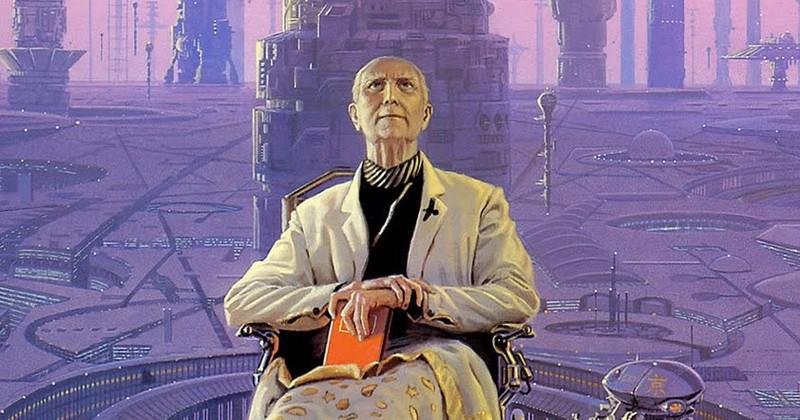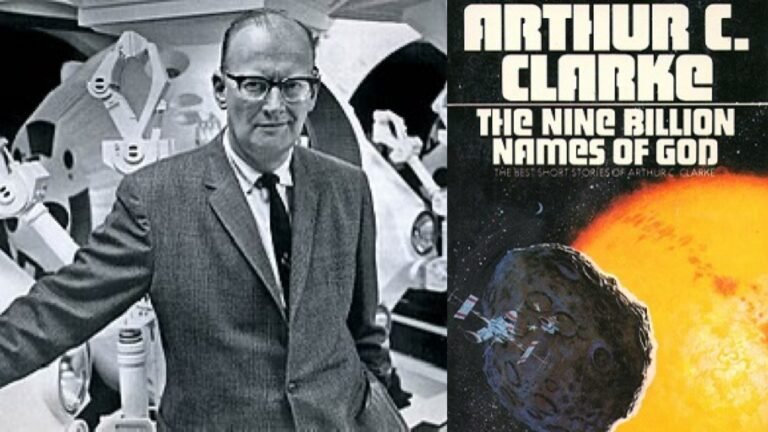
In the vast expanse of science fiction literature, few works have left an indelible mark on the genre like Isaac Asimov’s Foundation series. This epic saga, which spans millennia and chronicles the fall of a mighty Galactic Empire, has captivated readers for generations, inspiring countless other works of science fiction and fantasy.
At the heart of this timeless tale is the story of Hari Seldon, a brilliant mathematician who develops the field of “psychohistory” – a fictional science that allows him to predict the future with uncanny accuracy. Seldon foresees the inevitable collapse of the Galactic Empire and the subsequent plunge into a dark age lasting 30,000 years. Determined to shorten this period of barbarism, he establishes the Foundation, a refuge of scientists and scholars tasked with preserving humanity’s knowledge and guiding its eventual resurgence.
The Visionary Mind of Isaac Asimov
To fully appreciate the depth and significance of the Foundation series, it is essential to understand the remarkable life and mind of its creator, Isaac Asimov. Born in Russia in 1920 and emigrating to the United States as a child, Asimov would go on to become one of the most prolific and influential science fiction authors of the 20th century.
Asimov’s love for science fiction was ignited at a young age, when he began devouring the pulp magazines that were the lifeblood of the genre in the early 20th century. As a child, he helped his father in their family’s candy store, where he was exposed to these publications and the boundless possibilities they represented. This early exposure to the wonders of science fiction would shape Asimov’s creative vision and inspire him to become a writer himself.
In 1937, at the tender age of 18, Asimov published his first science fiction story, “Cosmic Corkscrew.” This marked the beginning of a remarkable literary career that would span over 50 years and include more than 500 books, articles, and short stories. Asimov’s prodigious output was matched only by the breadth of his interests, as he wrote not only in the realm of science fiction but also on topics ranging from biochemistry and astronomy to history and religion.
It was during the 1940s, however, that Asimov truly cemented his status as a titan of science fiction. It was in this decade that he introduced the concept of “psychohistory” and began laying the groundwork for the Foundation series, which would go on to become his most celebrated and influential work.
The Birth of a Sci-Fi Masterpiece
The origins of the Foundation series can be traced back to a single short story, Nightfall, published in 1941. This tale, set on the planet Lagash, which is perpetually bathed in the light of multiple suns, explores the psychological and societal implications of the inhabitants’ first encounter with the night sky and the stars. The story was a critical and popular success, establishing Asimov as a rising star in the science fiction community.
Inspired by the positive reception of Nightfall, Asimov began to envision a larger narrative that would explore the themes of societal collapse and the preservation of knowledge. Drawing inspiration from the fall of the Roman Empire, Asimov began to craft a series of interconnected short stories that would eventually become the Foundation trilogy.
The first of these stories, Foundation, was published in 1942, introducing readers to the world of Hari Seldon and his psychohistory. Over the next eight years, Asimov would publish a total of eight stories, which were later collected and published as the Foundation trilogy in 1951.
The trilogy consists of the following books:
Foundation (1951)
Foundation and Empire (1952)
Second Foundation (1953)
The series was an immediate critical and commercial success, cementing Asimov’s reputation as one of the most important and influential science fiction authors of his time. In 1966, the Foundation trilogy was awarded the Hugo Award for Best All-Time Series, a testament to its enduring legacy and impact on the genre.
The Themes and Concepts of Foundation
At the heart of the Foundation series lies a rich tapestry of themes and concepts that have captivated readers for generations. Chief among these is the idea of the “Galactic Empire,” a vast, sprawling civilization that has spanned the Milky Way for over 12,000 years. This empire, which is modeled after the decline and fall of the Roman Empire, serves as the backdrop for the series’ central conflict.
Hari Seldon’s development of psychohistory, a fictional science that allows him to predict the future with uncanny accuracy, is another key element of the Foundation series. This concept, which is inspired by the kinetic theory of gases, posits that the behavior of large groups of people can be predicted with statistical precision, even if the actions of individual members cannot be foreseen.
The series also explores themes of knowledge preservation, the nature of power and authority, and the cyclical nature of civilizations. As the Galactic Empire crumbles, Seldon and his followers work to establish the Foundation, a refuge of scientists and scholars tasked with preserving humanity’s accumulated knowledge and guiding its eventual resurgence.
Throughout the series, Asimov masterfully weaves these themes together, creating a rich and complex narrative that has resonated with readers for decades. The Foundation series is not merely a work of science fiction; it is a profound exploration of the human condition, the nature of power, and the fragility of civilization.
The Enduring Legacy of Foundation
The impact of the Foundation series on the science fiction genre and popular culture as a whole cannot be overstated. Asimov’s vision of a vast, technologically advanced Galactic Empire has become a staple of the genre, influencing countless other works of science fiction, from Star Wars to Warhammer 40,000.
The concept of psychohistory, with its ability to predict the future behavior of large groups, has also had a lasting impact on the genre. This idea has been explored and expanded upon in numerous other works, demonstrating the enduring influence of Asimov’s groundbreaking ideas.
Beyond its impact on science fiction, the Foundation series has also been recognized as a work of literary merit, with the trilogy being awarded the prestigious Hugo Award for Best All-Time Series in 1966. This accolade, which placed the series above such iconic works as J.R.R. Tolkien’s The Lord of the Rings and Edgar Rice Burroughs’ Barsoom series, is a testament to the series’ lasting cultural significance.
In 2021, the Foundation series will receive its first major television adaptation, with a highly anticipated series set to debut on Apple TV+. This adaptation, which boasts Asimov’s own daughter, Robyn Asimov, as one of its executive producers, is sure to introduce the timeless story of the Foundation to a new generation of viewers.
Whether you’re a long-time fan of the Foundation series or a newcomer to the world of Isaac Asimov, there has never been a better time to immerse yourself in this science fiction masterpiece. With its rich themes, complex characters, and visionary concepts, the Foundation series remains a must-read for any lover of science fiction and a testament to the enduring power of great storytelling.
Exploring the Asimov Verse: Recommended Readings
For those eager to delve deeper into the rich tapestry of Isaac Asimov’s literary universe, there are several other works that are highly recommended:
Foundation (Volume Unique) – The complete Foundation trilogy in a single, beautifully-bound volume.
Box Trilogy Foundation – The Foundation trilogy in a deluxe box set.
Nightfall – The short story that laid the groundwork for the Foundation series.
I, Robot – A collection of short stories that explore Asimov’s famous “Three Laws of Robotics”.
The Caves of Steel – A detective novel set in Asimov’s “Robot” universe, which shares connections with the Foundation series.
By exploring these additional works, readers can gain a deeper understanding of Asimov’s vast and interconnected literary universe, as well as the breadth of his creative vision and the enduring impact of his ideas.
Conclusion: The Timeless Appeal of Foundation
In the ever-evolving landscape of science fiction, Isaac Asimov’s Foundation series stands as a towering achievement, a work of unparalleled vision and enduring relevance. From its exploration of the cyclical nature of civilizations to its groundbreaking concepts like psychohistory, the Foundation series has captivated readers for generations and continues to inspire new generations of writers, filmmakers, and thinkers.
As the series prepares to make its highly anticipated debut on the small screen, the timeless appeal of Foundation is sure to be rediscovered by a new audience. Whether you’re a lifelong fan or a newcomer to the world of Isaac Asimov, the Foundation series is a must-read, a testament to the power of great storytelling and the enduring brilliance of one of science fiction’s true masters.





